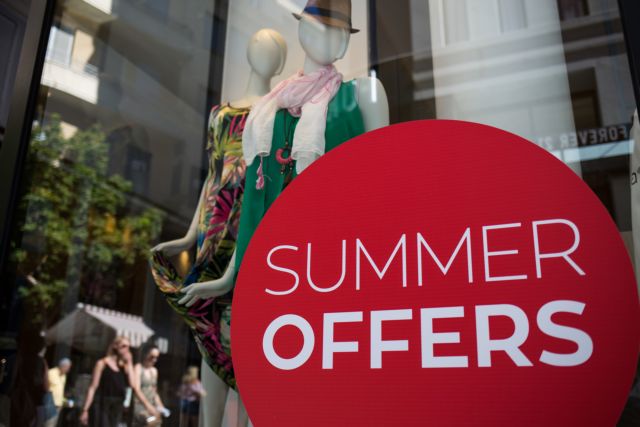
Consumers chose holidays, the sea and entertainment this summer and not shop windows despite the summer sale season.
President of the Piraeus Chamber of Commerce and Industry (EVEP) and the Attica Regional Chamber Council (PESA) Mr. Vassilis Korkidis noted the disappointment of merchants in the urban centers and regional markets ahead of the end of the summer sales on 31 August, noting, however that shops in central Athens and tourist destinations were happier.
With regard to domestic consumption, 8 out of 10 Greeks, despite the generous discounts, were hesitant, notes Mr. Korkidis, specifically in clothing and footwear, since the sales volume was reduced by -18% and turnover by -13%.
Fall in clothing and footwear
It should be noted that according to the latest data from Hellenic Statistical Authority-ELSTAT, the most popular discount branch, that of clothing, had the lowest percentage of annual price increase at just 3.4%, compared to inflation levels at 11.6%. Unlike most retail sectors, cosmetics and home goods continued this year’s upward trend during the sales season.
This year’s summer sales confirm the continuous changes in consumption habits, which adapt to the standard of living and the real disposable income of citizens.
There is also a negative change in the psychology of consumers with pessimism evident in 7 out of 10 that, after the pandemic, instead of a better period without restrictions, they are forced by energy costs into belt-tightening.
These difficulties in Greece are confirmed by the fact that 45% of consumers already owe 1 billion euros for overdue electricity bills.
In general, 6 out of 10 find it difficult to meet their obligations and 8 out of 10 have reduced their purchases of consumer products.
Price is the criterion
At the same time, PwC’s “Global Consumer Insights Survey” in 25 countries shows that 2 out of 3 consumers buy with price as the main criterion and wait for offers to make purchases, while 1 out of 3 postpone some of their purchases.
2 in 10 are spending more this year on sale items, 5 in 10 are spending the same amount as last year and 3 in 10 are spending less.
The same survey reports that more than 1 in 4 consumers are cutting back on a number of goods categories, including luxury goods, designer clothing, expensive food, entertainment and even big-name food brands, due to the increase in prices, both in physical and online stores.
Different levels within Attica
The picture is similar in the markets of Attica, where, however, a “mosaic” of consumption and sales of many speeds is observed between urban centers and regional markets, as well as between large chains and small shops.
However, apart from the tourist areas of the country, trade in department stores, superstores, shopping centers and discount villages in the markets of Attica is better than expected, during the period of summer sales.
Why an increase in turnover?
The total increase in retail trade turnover between April and June, according to ELSTAT, which in nominal terms reached 42 billion euros with an increase of 22%, compared to the corresponding quarter of 2021, is attributed to the low levels of 2021 and high inflation, while it does not reflect the entire retail trade.
However, entering the third quarter, retail trade is trying to make the most of the sale season, with businesses prioritizing inventory liquidation to meet their financial obligations and many expected to extend seasonal offers at least ten days after the end of the regular summer sales, for the benefit of traders and consumers.
At least demonstrably, this year’s summer sales managed to contain and limit galloping inflation by half a unit.
Latest News

IMF: US Tariffs Shake Global Economy, Outlook Downbeat
IMF slashes global growth forecast to 2.8% as U.S. tariffs create uncertainty and ‘negative supply shock

First Step Towards New Audiovisual Industry Hub in Drama
The project is set to contribute to the further development of Greece’s film industry and establish Drama as an audiovisual hub in the region

Airbnb Greece – Initial CoS Ruling Deems Tax Circular Unlawful
The case reached the Council of State following annulment applications filed by the Panhellenic Federation of Property Owners (POMIDA)

Mitsotakis Unveils €1 Billion Plan for Housing, Pensioners, Public investments
Greek Prime Minister Kyriakos Mitsotakis has announced a new set of economic support measures, worth 1 billion euros, aiming to provide financial relief to citizens.

Alter Ego Ventures Invests in Pioneering Gaming Company ‘Couch Heroes’
Alter Ego Ventures' participation in the share capital of Couch Heroes marks yet another investment by the Alter Ego Media Group in innovative companies with a focus on technology.

Corruption Still Plagues Greece’s Driving Tests
While traffic accidents continue to claim lives on Greek roads daily, irregularities and under-the-table dealings in the training and testing of new drivers remain disturbingly widespread

Pope Francis Died of Stroke and Heart Failure Vatican Confirms
As news of the official cause of death spread, tributes poured in from across the globe. The 1.4 billion-member Catholic Church is united in grief, remembering a pope who championed inclusion, justice, and compassion

Increase in Both Museum Visits, Revenues for 2024
As expected, the Acropolis was the top archeological site in the country, followed by Sounion, Mycenae, the ancient theater of Epidaurus, and Vergina in northern Greece

Where Greece’s Tourists Come From: A Look at 2025’s Top Visitor Markets
The United Kingdom continues to hold the top spot as the largest source of incoming tourism, with 5.6 million seats booked for Greece this summer — up 2.2% from last year. This accounts for 20% of all international air traffic to Greece

Pope Francis: A Pontiff Who Reshaped the Papacy and Sparked a Global Conversation
His first words from the balcony of St. Peter’s Basilica—“Brothers and sisters, good evening”—set the tone for a pontificate that would challenge norms, favor mercy over dogma, and bring the papacy closer to the people.











![Πλημμύρες: Σημειώθηκαν σε επίπεδα ρεκόρ στην Ευρώπη το 2024 [γράφημα]](https://www.ot.gr/wp-content/uploads/2025/04/FLOOD_HUNGRY-90x90.jpg)




![Ξενοδοχεία: Μεγάλο το ενδιαφέρον για επενδύσεις στην Ελλάδα – Η θέση της Αθήνας [γραφήματα]](https://www.ot.gr/wp-content/uploads/2025/03/Athens-hotels-90x90.jpg)
























 Αριθμός Πιστοποίησης
Αριθμός Πιστοποίησης